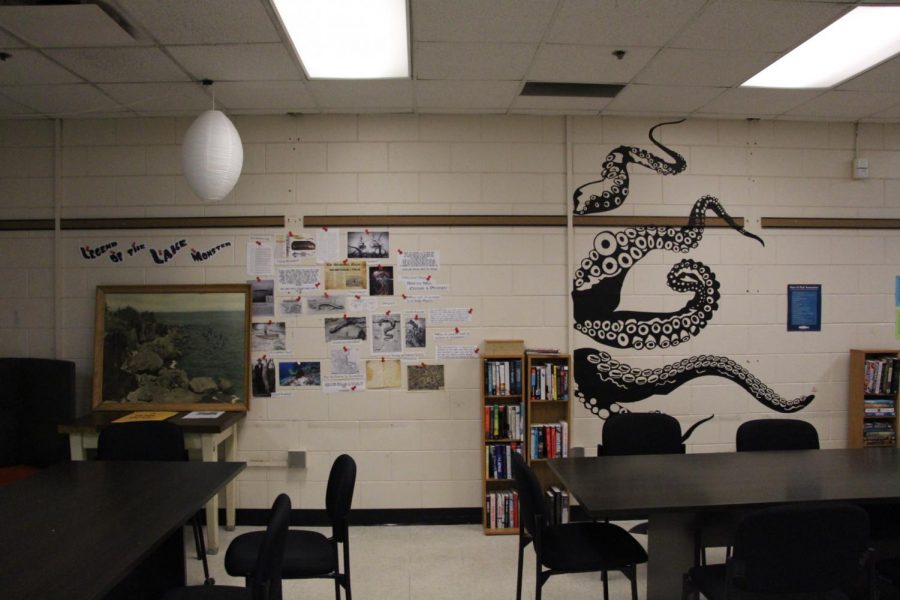NaNoWriMo challenges developing authors
Once a week a few students made their way to the writer’s room so they could discuss their progress with their novels. Sam Oppenheimer who is a full time volunteer who works in the writer’s room would facilitate these conversations. These meetings usually consisted of offering each other advice and checking in with each other’s progress.
January 11, 2019
Pretty much everyone has something that they can cling too and say ‘this is my thing, this is what I’m good at.’ If that one other thing for you is writing or storytelling in any form, you should probably know about NaNoWriMo.
NaNoWriMo (or National Novel Writing Month) takes place every November. Once a week some students made their way to the Writer’s Room to discuss their literary pursuits. Sam Oppenheimer is a full-time volunteer who works in the Writer’s Room and also is working on her own novel. Oppenheimer shared how those who participate in NaNoWriMo handle it. “There’s some people that don’t do anything else during the month of November because the goal is to hit 50,000 words of a novel which for an adult novel is not quite enough. For a children’s novel more than enough.¨
Helen Anton is a junior who wrote a novel for NaNoWriMo. Anton broke down just how challenging NaNoWriMo really is. “Your goal by the end of the month is to have written 50,000 words so I did the math and it averages to about 1,667 words every day and it’s really easy to fall behind and you have to be really diligent about writing every day.”
Oppenheimer shared a bit about the origins of NaNoWriMo and how its intensity can actually be very helpful for developing authors. “Its a goal started by a crazy person, him and his friends decided to just do it and they got a lot out of it because the only way you can learn to write a novel is to write a novel.” Oppenheimer further elaborated about why learning to write a novel is so difficult. “There’s really no other way. You teach yourself how to do it as you do it you can take all the classes that you want but until you write the novel you’re not gonna understand how to write the novel.”
Oliver Piotrowski is a senior who also participated in NaNoWriMo. Piotrowski talked a bit about why more people should be proficient in writing in the modern world, even if those people don’t live lives that rely on creativity. “I think that writing is a really important skill to have that- there are quite a few people who are very smart and intelligent in other aspects of their life but when it comes to writing or words just kinda suck and I’ve read a lot of scientific papers that are just bad and I think that learning how to write is a very important skill.”
Anton shared a bit about how writing had helped in stressful situations. “I don’t have a lot of outlets so this is the main way I get out all my anxieties and stuff like that.” Anton specified how exactly writing served as an outlet for anxiety. “If I have a really big assignment due it will help me channel a lot of that anxiety into the characters… What the characters are dealing with are so much bigger and so much more important than what I’m dealing with and it helps me put things in perspective.”
Piotrowski talked about why they like writing and how it has helped them. “It’s always been kinda my thing it’s one of the hobbies that I’ve never given up before and I did for a while when I was depressed… Writing for me is my release and where I can escape into another planet for a while also I just have a lot of ideas in my head and if I don’t get them all out I’ll explode.”
Oppenheimer went further into detail about how useful programs like NaNoWriMo can be for authors. “It’s really hard to discipline yourself to write and pretty much any writer will tell you writing is great but actually putting words on paper is horrible so this is encouragement for that.”
Oppenheimer went further into detail about how people react to the challenge presented by NaNoWriMo “There are people who don’t do laundry during the month of November who say to everybody ‘sorry we can’t hang out for the entire month I’m busy,’ and those are extreme people”
Oppenheimer contrasted this with her approach to NaNoWriMo. “there are people like me who just write a little bit more than I normally would and make a little bit more effort so on Saturday night when I got home instead of watching TV or reading for two hours I wrote. So it’s just making those substitutions.”
NaNoWriMo at the end of the day is a tool that can be used by different people for different things. Some use it to educate others about how helpful writing can be, others use it as a tool to build up their own writing skills, and some use it just as a way to have fun. If you like writing or storytelling of any form, you should definitely try to see if NaNoWriMo is something you’re capable of.






